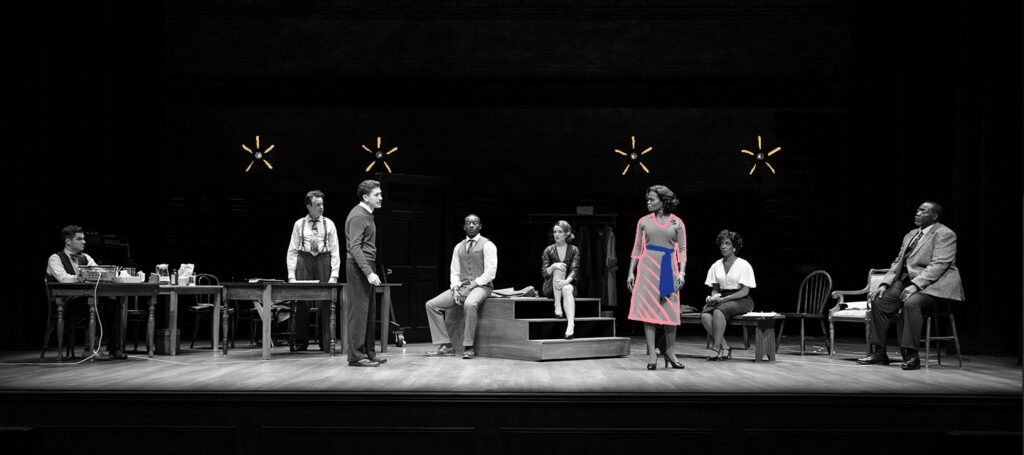


At ‘Trouble in Mind’, School is in Session
When you hear “revival of a play” you’ll most likely imagine one of the countless Broadway productions of Mamet, O’Neill, or Williams featuring a celebrity. Roundabout’s production of Trouble in Mind certainly is not that.
Strictly speaking, it’s not even a revival; a pre-show announcement informs the audience, “Alice Childress’ Trouble in Mind premiered off-Broadway in 1955. It was optioned for Broadway–on the condition that Childress tone down its content. She refused, and the transfer was canceled. Over 60 years later, this production marks the play’s Broadway debut, exactly as Alice Childress wrote it.”
This Broadway premiere is long-overdue but oh-so welcome.
The play is about a group of actors rehearsing a new Broadway show, in the process revealing that the script, and the industry as a whole, are deeply racist. Clearly, we are still in need of the exact critiques the play offers.
Trouble in Mind begins with Wiletta (played by the divine LaChanze) stepping on stage and silently enjoying a rush of emotion: “A theater always makes me feel that way… gotta get still for a second.” Her response is deeply relatable–especially after a year and a half of not being able to be in theaters. John (Brandon Michael Hall) enters with similar enthusiasm, excited for his first Broadway show. But Wiletta quickly brings him down to earth, telling him “Show business, it’s just a business. Colored folks ain’t in no theater.”
Wiletta gives him a crash course in being a Black actor on Broadway, telling him to say he was in the last revival of Porgy and Bess, to not mention that he went to acting school, to not come across as desperately in need of a job, to say he loves the play, and to always smile and laugh at the (white) director’s jokes to make him feel superior. She openly admits “It is Tommish,” but “You either do it and stay or don’t do it and get out.”
The more experienced Black actors know the drill. Millie (the hilarious Jessica Frances Dukes) laments “Last show I was in, I wouldn’t even tell my relatives. All I did was shout ‘Lord, have mercy!’ for almost two hours every night.” She and Wiletta complain that they are always cast as stereotypes named after flowers (Gardenia, Magnolia, Chrysanthemum) or jewels (Crystal, Pearl, Opal). In the show they are rehearsing, Chaos in Belleville, they play Petunia and Ruby–more flowers, more jewels, more “Lord, have mercy!”
Sheldon (Chuck Cooper) likewise balks at his extremely limited role: most of his lines are “Yes, sir” and he spends the whole third act whittling a stick. They know how racist the play is, like so many they have been in or seen. Wiletta speaks the truth: “things that aggravate me always run for a long time… cause what bugs me is what sends somebody else.”
Completing the cast are the white actors: Judy (Danielle Campbell), a first-time actress who is well-meaning, but clueless about her microaggressions, and Bill (Don Stephenson), a soap-opera star who doesn’t want to eat with his Black castmates. At the helm is the director, Al Manners (Michael Zegen), a self-righteous, wanna-be white savior who thinks he is making political art.
Manners tells Wiletta to work on intentions and justifications for her choices, a style of performing she isn’t used to. This command backfires: after she studies the script and thinks critically about her character, she realizes just how unjustifiable it really is, and starts asking for changes. Manners offers post-racial nonsense, claims the play teaches an important lesson, and even goes on a tirade about how hard it is to be white.
Though Wiletta begins the play teaching John how to play along, by the end she teaches a different lesson, one of defiance and standing up for yourself. She gives a glorious lecture on the words “dignity” and “justified.” In the middle of this rousing monologue she tells the group, “Oh, I’m holdin’ class today.” I hope the audience takes notes.
Childress gives us an abundance of nuance. Neither her Black nor white characters are a monolith. Manners and Bill are blatantly racist, Judy is imperfect but does critique the script and doesn’t want to be lumped in with them; Wiletta and John demand changes and consider quitting, while Sheldon and Millie need the money and are willing to just do the play. All of her characters are complex and well-rounded, with personal motivations and vivid backstories. Most importantly, the play always prioritizes and centers the Black characters, their experiences, and their hurt.
The direction by Charles Randolph-Wright nails the play’s deep tensions, melodramatic metatext, and hilarious backstage comedy. The entire cast is superb, one of the strongest ensembles in recent memory. In all, this is a commensurate production of brilliant play.
Of course, the star here is LaChanze; she is a gift to the theater and we do not deserve her. Her performance of Wiletta is grounded in what they share: a deep pain, a dream to do something great as an actress, and a passion to fight for racial justice in the theater.
Trouble in Mind explores many issues in the industry, from racial inequity and concerns over accurate representation to union rules and sexual harassment. It is an eerie portrait, a haunting reminder that these problems are nothing new. Trouble in Mind finally being on Broadway is a call to arms, an insistence that things need to change.
When WiIetta proposes script alterations, Manners says “The American public is not ready to see you the way you want to be seen.” A similar sentiment was clearly said to Childress. Over 60 years later, the American public better be ready for it. As Wiletta says “We have to go further and do better.”
Keep Reading

‘Diana’: A Princess Pop Musical Gone Wrong
During a time in which we’ve seen an explosion of content driven by an interest in the British Royal Family, you might expect Diana, to come off as the long-lost sibling to Peter Morgan’s The Crown or Pablo Lorrain’s new film Spencer. Instead, this new production (which is also streaming alongside The Crown on Netflix) […]
Read More
Caroline, or Change: Inertia Buries a Musical Masterpiece
When Caroline, or Change premiered on Broadway in 2004, critics lacked the imagination to appreciate what they had been given: a story that prioritized how many Black women bury their trauma in order to survive. Fifteen years later, one prominent theatre critic acknowledged that he was finally able to receive the glory of the story […]
Read More












